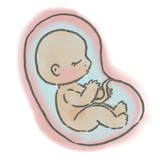How Tryptophan Affects Newborn Sleep
Tryptophan is an essential amino acid that plays a crucial role in melatonin production. Here's how the process works:
- Tryptophan to Serotonin: When you consume foods containing tryptophan, your body converts it into serotonin. This process occurs in the brain, where tryptophan crosses the blood-brain barrier.
- Serotonin to Melatonin: Once serotonin is produced, it can be converted into melatonin, particularly in the evening or in low-light conditions. Melatonin is the hormone responsible for regulating the sleep-wake cycle, signaling to the body that it's time to sleep.
- Tryptophan's Role in Sleep: The presence of tryptophan in the body helps ensure there’s enough serotonin available for melatonin production. Without sufficient tryptophan, your body may have a harder time making enough melatonin, potentially leading to sleep disruptions.
Did you know the time of day you express breast milk could impact your baby’s sleep? Tryptophan levels naturally fluctuate with the mother’s circadian rhythm, being higher in the evening, which supports melatonin production in your baby’s body. This helps signal that it’s time to wind down and sleep.
Research shows babies who consume milk with higher tryptophan levels before bedtime fall asleep faster and sleep longer.
If you’re expressing and storing breast milk for future use, it's worth noting the time of day you pump. Milk expressed at night contains higher tryptophan levels compared to milk expressed during the day. Consider labeling your stored milk with the time it was expressed.
When it’s time for an evening or nighttime feed, you can offer milk with higher tryptophan to promote better sleep.


 New Zealand Dollar (NZD)
New Zealand Dollar (NZD)
 Hong Kong Dollar (HKD)
Hong Kong Dollar (HKD)
 Japanese Yen (JPY)
Japanese Yen (JPY)
 Singapore Dollar (SGD)
Singapore Dollar (SGD)
 South Korean Won (KRW)
South Korean Won (KRW)
 United Arab Emirates Dirham (AED)
United Arab Emirates Dirham (AED)
 Canadian Dollar (CAD)
Canadian Dollar (CAD)
 British Pound (GBP)
British Pound (GBP)
 Euro (EUR)
Euro (EUR)
 Swiss Franc (CHF)
Swiss Franc (CHF)
 Swedish krona (SEK)
Swedish krona (SEK)







